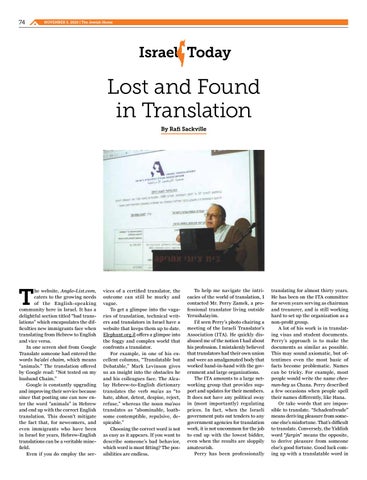74 38
NOVEMBER 5, 2020 | The Jewish Home OCTOBER 29, 2015 | The Jewish Home
Israel Today
Lost and Found in Translation By Rafi Sackville
T
he website, Anglo-List.com, caters to the growing needs of the English-speaking community here in Israel. It has a delightful section titled “bad translations” which encapsulates the difficulties new immigrants face when translating from Hebrew to English and vice versa. In one screen shot from Google Translate someone had entered the words ba’alei chaim, which means “animals.” The translation offered by Google read: “Not tested on my husband Chaim.” Google is constantly upgrading and improving their service because since that posting one can now enter the word “animals” in Hebrew and end up with the correct English translation. This doesn’t mitigate the fact that, for newcomers, and even immigrants who have been in Israel for years, Hebrew-English translations can be a veritable minefield. Even if you do employ the ser-
vices of a certified translator, the outcome can still be murky and vague. To get a glimpse into the vagaries of translation, technical writers and translators in Israel have a website that keeps them up to date. Elephant.org.il offers a glimpse into the foggy and complex world that confronts a translator. For example, in one of his excellent columns, “Translatable but Debatable,” Mark Levinson gives us an insight into the obstacles he and his colleagues face. The Alcalay Hebrew-to-English dictionary translates the verb ma’as as “to hate, abhor, detest, despise, reject, refuse,” whereas the noun ma’oos translates as “abominable, loathsome contemptible, repulsive, despicable.” Choosing the correct word is not as easy as it appears. If you want to describe someone’s bad behavior, which word is most fitting? The possibilities are endless.
To help me navigate the intricacies of the world of translation, I contacted Mr. Perry Zamek, a professional translator living outside Yerushalayim. I’d seen Perry’s photo chairing a meeting of the Israeli Translator’s Association (ITA). He quickly disabused me of the notion I had about his profession. I mistakenly believed that translators had their own union and were an amalgamated body that worked hand-in-hand with the government and large organizations. The ITA amounts to a large networking group that provides support and updates for their members. It does not have any political sway in (most importantly) regulating prices. In fact, when the Israeli government puts out tenders to any government agencies for translation work, it is not uncommon for the job to end up with the lowest bidder, even when the results are sloppily amateurish. Perry has been professionally
translating for almost thirty years. He has been on the ITA committee for seven years serving as chairman and treasurer, and is still working hard to set up the organization as a non-profit group. A lot of his work is in translating visas and student documents. Perry’s approach is to make the documents as similar as possible. This may sound axiomatic, but oftentimes even the most basic of facts become problematic. Names can be tricky. For example, most people would write the name chesnun-hey as Chana. Perry described a few occasions when people spell their names differently, like Hana. Or take words that are impossible to translate. “Schadenfreude” means deriving pleasure from someone else’s misfortune. That’s difficult to translate. Conversely, the Yiddish word “fargin” means the opposite, to derive pleasure from someone else’s good fortune. Good luck coming up with a translatable word in
























